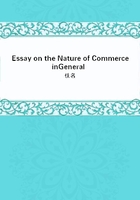
第27章
Of Barter In Part I an attempt was made to prive that the real value of everything used by manis proportionate tothe quantity of Land used for its production and for the upkeep of those who have fashioned it. In this second part, after summing up the different degrees of fertility of the land in several countires and the different kinds of produce itcan bring forth with greater abundance according to its intrinsic quality, and assuming the establishment of towns and their markets to facilitate the sale of these products,it will be shewn by comparing exchanges which may be made, wine for cloth, corn for shoes, hats, etc. and by the difficulty which the transport of these different products or merchandises would involve, that it was impossible to fix their respective intrinsic value, and there was absolute necessity for man to find a substance easily transportable, not perishable, and having by weight a proportion or value equal to the different products and merchandises, necessary or convenient. Thence arose the choice of gold and silver for large business and of copper for small traffic.
These metals are not only durable and easily transported but correspond to the employment of a large area of land for their production, which gives them the real value desirable in exchange.
Mr Locke who, like all the English writers on this subject, has looked only to market prices, lays down that the value of all things in proportionable to their abundance or scarcity, and the abundance or scarcity of the silver for which they are exchanged. It is generally known that the prices of produce and merchandise have been raised in Europe since so great a quantity of silver has been brought thither from the West Indies.
But I consider that we must not suppose as a general rule that the market prices of things should be proportionable to their quantity and to that of the silver actually circulating in one place, because the products and merchandise sent away to be sold elsewhere do not influence the price of those which remain.
If, for example, in a market town where there is twice as much corn as is consumed there, we compared the whole quantity of corn to that of silver, the corn would be more abundant of corn to that of silver, the corn would be more abundant in proportion than the silver destined for its purchase; the market price, however, will be maintained just as if there were only half the quantity of corn, since the other half can be and even must be, sent into the city, and the cost of transport will be included in the city price which is always higher than that of the town. But apart from the case of hoping to sell in another market, I consider that Mr Locke's idea is correct in the sense of the following chapter, and not otherwise.